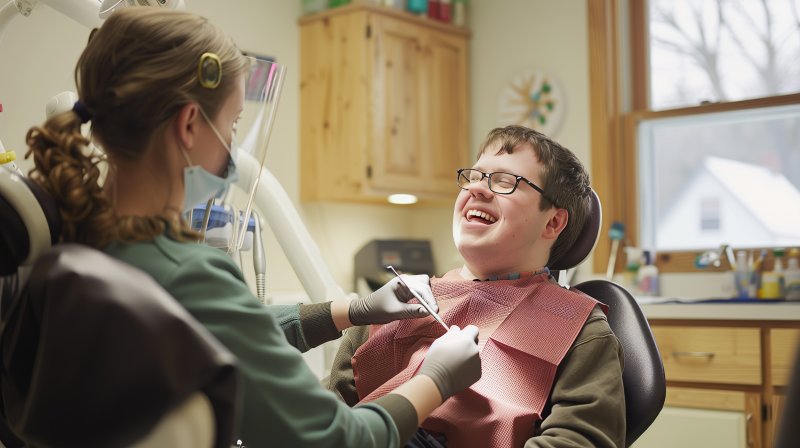
Children with physical and intellectual disabilities often experience greater challenges when it comes to ensuring the health and longevity of their smiles. At-home oral hygiene and regular dental visits can prove difficult for parents and caregivers, as many young patients find it hard to sit still or be surrounded by various sights, smells, and sounds.
This is why dental sedation is now used by many professionals. Not only is it effective in minimizing stress, but it also creates a more positive experience for the dentist, patient, and parent. Keep reading to discover how incorporating nitrous oxide or general anesthesia can help.
What Makes Dental Visits Challenging for Patients with Special Needs?
Visiting the dentist’s office can be difficult for anyone, especially if they suffer from dental anxiety or past trauma. However, for a child with special needs (i.e., autism, cerebral palsy, down syndrome, etc.), these visits can be increasingly challenging if not impossible.
Many parents experience difficulty finding a dentist who can provide special accommodations because of the time and attention that is required.
Some children may struggle with sensory issues, so the sights and sounds often found inside a dental office can be too much. Others may find it hard to sit still because of a physical disability or find it problematic to have someone touch their mouth.
These are just a few of the issues that can make it hard for a parent to get their child in for a dental appointment; however, working with a dentist who offers special needs dentistry and sedation can help.
Which Methods of Sedation Can Be Used?
Many dentists who offer sedation provide nitrous oxide, as it is considered the mildest form. Inhaled through a mask, it delivers an almost immediate sense of relaxation. Your child will feel completely at ease within minutes of starting the process. This allows their dentist to complete the necessary oral healthcare treatment(s) before turning off the gas, removing the mask, and allowing your child to return home.
Another option dentists offer is IV sedation. Medication is delivered into the bloodstream for fast-acting effects, allowing your child to become calmer and more relaxed so that treatment can be provided more efficiently.
It’s also possible to receive general anesthesia. Also referred to as sleep dentistry, it is highly recommended when a patient has extreme anxiety or special needs. This type of sedation is generally administered at a local hospital or facility, and professionals remain nearby to monitor your child’s vitals. This ensures a safe and effective appointment.
How Does Sedation Positively Impact a Patient?
When discussing dental sedation options with your child’s dentist, it’s important to not only determine which solution will be safest but also how it will positively impact them during their visit.
Children with special needs are often at a greater risk for tooth decay because of nutrition-related problems, dry mouth, and regular consumption of sugary medications. By administering sedation, it gives the dentist a chance to provide care that is essential for better oral and overall health. Since these children may take various medications or live with abnormalities that affect their oral and facial development (i.e., delayed tooth eruption, missing teeth, etc.), these regular visits are crucial to ensure the longevity of their smile.
You no longer have to dread taking your child to the dentist. Instead, inquire about available sedation options to create a positive, comfortable, and life-changing experience.
About the Author
Dr. Homer Sedighi is a board-certified pediatric dentist who offers special needs dentistry as well as dental sedation. Working closely with patients who have physical and intellectual disabilities, he and his team provide nitrous oxide and general anesthesia as safe and effective solutions for these individuals.
By incorporating sedation into their appointment, services can be provided more swiftly and successfully, leaving patients feeling more comfortable and at ease. If you want to learn whether sedation dentistry is a good option for your child with special needs, contact us at (636) 777-7777.